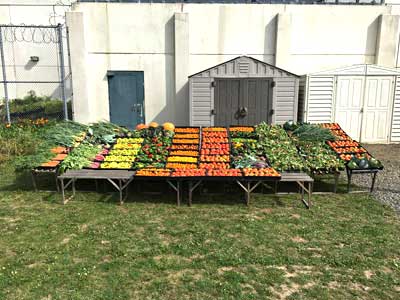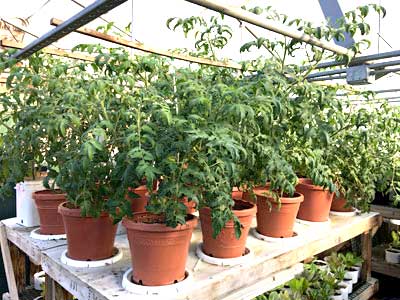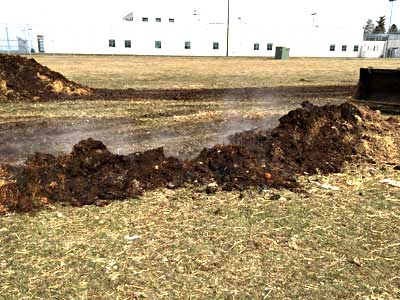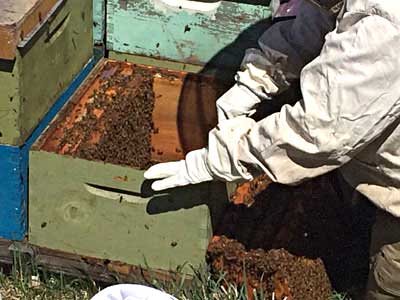 |
| A day’s harvest from the gardens in the summer of 2017. |
 |
| Tomatoes growing in pots in the heated greenhouse. |
 |
| Compost being windrowed at the Maine State Prison complex. |
 |
| One of the beehives at the Maine State Prison. |
By Polly Shyka
Photos by the Maine State Prison staff
Maine’s maximum security prison in Warren has quite the bustling farm within its walls. Each morning, a dozen or so men, donning golden T-shirts over their standard-issue denims, gather to make a plan for their time in the gardens. Greg, a wiry, suntanned, bright-eyed man in his 50s, leads the team. He has a bouncy way about him, popping up and down from a crouch to standing in but a second. He is fast-talking and fast-moving. Somehow he works, instructs and encourages his team members all at the same time.
Accompanied by a guard who works alongside them, the men move about from plot to plot. They weed here, harvest there. Gardens are everywhere. A bed of zinnias and purple verbena, underplanted with lettuce, edges “The Mile,” a long straight walkway connecting the men’s housing, outdoor space, industry and programming spaces, and the mess hall.
The 2-1/2 acres of gardens are all dead flat, with crisp edges, straight rows and uniform spacing throughout.
The soil is not great, everyone agrees. The last glaciers left a sandy loam soil at this Midcoast site, but when the prison was built in 1991, gravelly construction fill topped all outdoor spaces. Grass, mown shorter than short, was everywhere for the first few decades of use.
In 2015, the state hired a new warden and things started to get interesting. Sod was tilled up. Massive compost bins showed up along the perimeter fence. Ten thousand red wiggler worms arrived by mail. The new warden, Randall Liberty, placed a beehive by the south gate.
Enrichment is everywhere. The soil is enriched with site-made compost. The facility’s residents are enriched by the food that goes from garden to cafeteria. The men are enriched by the training, work and connection to the natural world. The work and dedication of all the players has created and maintains a most inspiring, if mostly invisible, farm in Maine.
Growing
While the soil is poor at the prison site, the effort being put into the gardens is not. The acres of gardens, scattered in most quarters of the facility, are full of vegetables, from peppers to broccoli to lettuce heads.
In the mental health unit, formerly the solitary confinement wing, the outdoor courtyard is practically covered by a large garden plot with rows and rows of tomato plants. On a hot July day, the unit commander on duty struggled with a green garden hose.
“That hose has a good story,” began Liberty. He explained that when he proposed the gardens to the leaders of this specialized unit, at first they balked. “We can’t have hoses, Warden. Those are schedule 1 tools.” (Certain tools are prohibited from different areas due to their potential to be used as weapons.) But with the warden’s permission and, indeed, encouragement, the guards themselves run hoses to keep up with the watering chores. The men use plastic watering cans to water new seedlings and crops in times of low rainfall.
The gardening crew in the main garden area harvests lettuce heads for the kitchen. Greg pulls plants while others strip leaves and place them in a clean wheelbarrow full of cold water. “We make do with what we have … what we can have,” says one of the men.
The men seem pretty busy, chipper and satisfied as they work. Not used to a lot of guests, several comment on how nice it is to have visitors. One man pulls a black Spanish radish from the ground, brushes it off and delivers it to the warden. “Thanks for coming by!” hollers another as we make our way to the composting area.
Composting
Food waste is composted on an industrial scale at the prison. The kitchen puts out over 3,000 meals per day, and, until last year, the prison paid to dispose of 250,000 pounds of food waste annually.
“Here’s where I can save money and free up money for programming,” Liberty explains. With a team of groundskeepers and kitchen staff, he planned a compost strategy.
“We store the food waste in 55-gallon drums, and once per week, we build a pile with the week’s food wastes, plus straw and mulch hay.”
A whole section of the grounds, inaccessible to residents but within the complex, is dotted with 12-foot-wide, 6-foot-tall, round compost piles.
“We max out at 80 bins,” Liberty says. At that point, many of the first piles will be ready for the gardens, making room for new piles. Rotational composting at work!
Not only food wastes are diverted from the waste stream. Liberty has instituted prison-wide recycling. Paper, paperboard and cardboard are shredded and composted. Trash from residential areas is sorted for composting, recycling and disposal.
Vermiculture
Among the tools at the recycling center is a large vermiculture contraption. In its own dedicated room in the basement, the welded metal bin teems with red wiggler worms. An enthusiastic resident, Brian, is wearing a white T-shirt that has a smiley face drawn in black marker on it. He shows off the setup. It is clean as a whistle and has not even a faint foul odor. Brian pulls back the vinyl cover on the 10-foot by 5-foot bin and digs down through the moist strips of newsprint to reveal the worms and their current feast. Bits of wet bread and noodles, fruit and cucumber skins are identifiable, but the worms move primarily through wet castings, their valuable contribution to the prison ecosystem. The castings will be harvested from the bottom of the bin weekly and used to further enrich the many gardens on site.
Leadership
Warden Randall Liberty is the kind of man who would look at ease in any uniform: suit and tie, surgeon’s scrubs, police blues or army fatigues. He is commanding and determined, yet bright and warm. The fact that he is the leader and head law enforcement officer of the prison population, larger than most small Maine towns, is never far from anyone’s mind.
Liberty arrived at the MSP in 2015 after seven years as sheriff at the Kennebec County jail in Augusta. The state of Maine launched a nationwide search to fill the prison warden vacancy, but quickly hired Liberty for his leadership, dedication to rehabilitation and his many years of service as a soldier, police officer and law enforcement instructor.
In his first year at the prison, Liberty, an avid gardener and new beekeeper himself, created the gardening program that is now entering its third growing season.
“Funding any programming at the prison is always a challenge,” he says. “We are the last in line in Augusta when appropriations happen.”
Undeterred by the lack of funds granted to implement his vision, Liberty turned to his own prison budget and started to get creative. He sees multiple benefits to the institution, the residents, the planet and to the state of Maine. This type of fiduciary-sustainability strategizing has been called triple-bottom-line thinking, where people, planet and profit all benefit.
Budget
Liberty wanted gardening at the prison to be paid work for the residents, not just something some did voluntarily, as in the past. If he couldn’t find programming dollars from the state, then he’d find them internally.
For example, in studying the fine print of the kitchen budget, he learned that the prison spent $35,000 on lettuce each year.
“We could grow some of that,” he thought, and proceeded to help the gardening crew set goals for what and how much food they would produce each growing season. In 2016 they harvested 6,500 pounds of produce; in 2017, 8,500.
Liberty is a systems thinker. He sees the prison as a whole made up of different but interconnected functions. There are industries, services, programs, security and operations that all present opportunities for cooperation. For example, he realized that instead of paying $60,000 to dispose of the 250,000 pounds of food waste that the kitchens at the complex create each year, the grounds team could compost all of that material. It’s an agricultural quadruple win: compost generated for the on-site gardens, recycling/composting and gardening jobs created for inmates, tons of material diverted from the waste stream, and money saved.
Jobs
Currently the prison pays seven men to oversee recycling efforts in the living quarters, five men to staff the recycling center that aggregates and sorts all facility waste, and 12 men to tend the gardens.
Jobs at the prison are a privilege. Men must be on good terms with prison staff, other residents and their own learning and rehabilitation goals to qualify for a job. Demand for jobs is much greater than supply. A resident who makes a rule infraction (i.e., gets in a fight, is caught with contraband, etc.) loses his job. Jobs are desirable because they build skills. They also benefit resident morale, self-worth and confidence. Gardeners at the prison log their hours transplanting and watering. They weed and harvest. Seeing a plant through from seed to fruit is a large skill set and one that has value to future employers.
“In regular life, I was so needed. In here, it also feels good to be needed,” one resident related.
Liberty is on the case. “We need more jobs for these guys,” says the Warden. “I want to provide as much opportunity to these men as possible: college classes, jobs and job training, rehab … These are the things that help men grow while they are in here.”
Author’s Note: The Maine State Prison has a strong volunteer program. If you have interest and ability, please contact the deputy warden at 207-273-5300 for more information.
About the author: Polly Shyka farms in Freedom, Maine, with her partner and three sons. Villageside Farm grows MOFGA-certified organic seedlings, herbs and vegetables.
